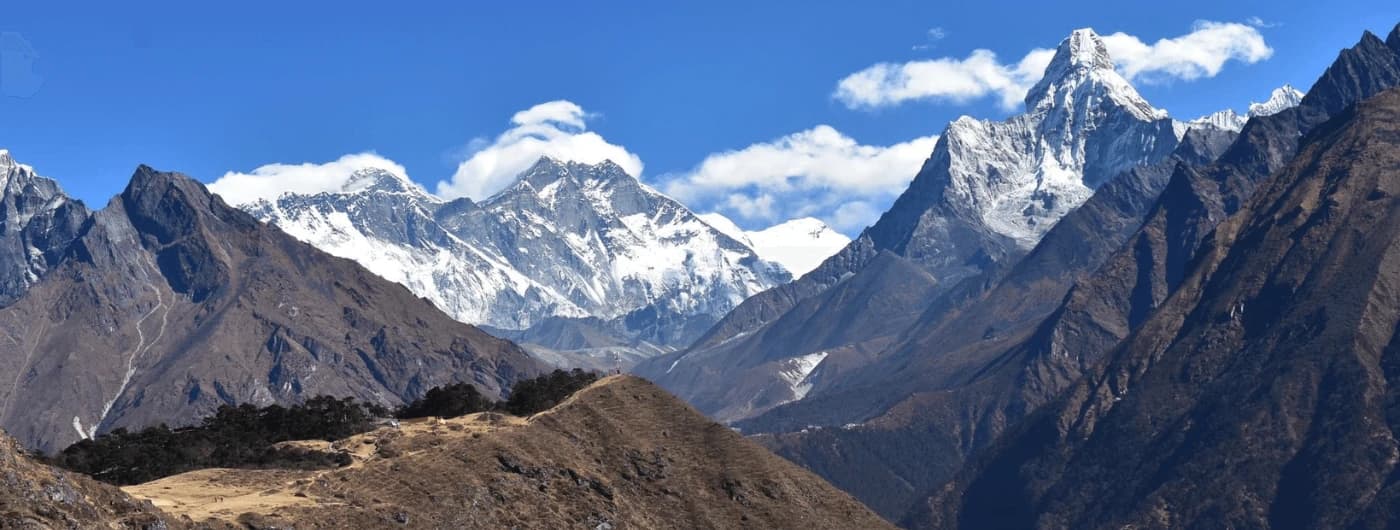So you finally thought of visiting the iconic Everest Base Camp Trek.
Yes! High Five✋
Till now, I will assume that you know about the itinerary, gears, and more. Now you must have been wondering about the expenses, right?
In this blog, we will be breaking down every cost that is required to trek the iconic "Everest Base Camp".
We will discuss permit fees, flight cost, guide prices, food, and accommodation, and more.
You’ll learn how much a typical 12-day Everest Base Camp trek costs, and the Everest Base Camp budget trek.
We also have Packages like Luxury Trek, 14-day Everest Base Camp Trek, and more.
By the end, you’ll have a clear picture of the EBC Cost and how to plan for an amazing adventure within your budget.
How Much Does the Everest Base Camp Trek Cost?
The cost of an Everest Base Camp trek in 2026 varies based on the level of service you choose. A basic trip costs between $800 and $1,000, while a luxury trip with helicopter flights can exceed $5,000.
Most travelers choose a standard package priced between $1,200 and $1,700. It covers flights, permits, meals, and guides. This option fits perfectly between comfort, safety, and affordability. Making it the most popular choice.
To manage your budget. You should understand the costs for transport, staff, permits, and lodging. In this blog, we will break down each expense to help you plan your journey.
Cost Breakdown for Everest Base Camp Trek
Understanding the financials is the first step to a well-planned trip. Here's a detailed look at all the expenses that contribute to the final Everest Base Camp trek.
Permits and Fees
Trekking in the Everest region requires two mandatory permits. These fees are a crucial part of the Everest Base Camp trek cost and are collected to support local communities and conservation.
| Permit | Cost for Foreigners (in USD) | Where to Get It |
| Sagarmatha National Park Permit | $25–$30 | Kathmandu (Nepal Tourism Board Office) or Monjo (on the trail) |
| Khumbu Rural Municipality Permit | $20 | Lukla (at the beginning of the trail) or Monjo |
Total Estimated Permit Cost: ~$50
If you book a package with Overland Trek Nepal. These are usually covered. So you don't have to hassle with obtaining them yourself and face any issues on the trail.
Flight to Lukla
Lukla is known for the most thrilling flights in the world; it is the primary way to access the Khumbu region. The round-trip flight from Kathmandu to Lukla is a significant portion of the total Everest Base Camp trek cost.
| Flight Type | Average Cost (One-Way) | Average Cost (Round-Trip) |
| Regular Airlines (e.g., Tara Air, Summit Air) | $225–$230 | $450–$460 |
| Helicopter Charter (Shared) | $500–$600 | $1,000–$1,200 |
The Kathmandu to Lukla flight cost can fluctuate based on the season and demand. During peak trekking seasons (spring and autumn), flights are more expensive and harder to book. It is crucial to factor this into your Everest Base Camp trek cost.
Note: Lukla flights are highly dependent on good weather. Delays and cancellations are common.
Having a buffer day in Kathmandu is a smart move to avoid stress. In case of extended delays, some trekkers opt for a helicopter flight. A more expensive alternative, but one that can get you on the trail faster.
Guide and Porter Services
Hiring a professional guide and a porter is highly recommended for a safe and enriching experience. These services are a key part of the Everest Base Camp trek cost.
A guide provides navigation, shares cultural insights, and manages logistics. A porter carries your main luggage, allowing you to trek with just a daypack.
| Service | Average Daily Rate (in USD) |
| Licensed Trekking Guide | ~$35–$40 |
| Porter (Carries up to 25 kg) | ~$22–$25 |
For a typical 12-day trek, a guide's cost would be around $420–$480, while a porter would cost around $265–$300.
If you're traveling in a pair. You can split the porter's cost, making it more affordable.
Nepal changed its trekking rules in 2023. Foreign trekkers now need a licensed guide. This rule covers most regions, including Everest Base Camp.
This regulation is for your safety and emergencies. This makes the Everest Base Camp trek cost a little higher for independent trekkers. But is a necessary expense for a secure journey.
Food and Accommodation
The Everest Base Camp trek cost is primarily driven by your food and accommodation choices. Teahouses along the trail provide basic rooms and meals.
| Expense Category | Average Daily Cost (in USD) |
| Accommodation | $5–$15 |
| Meals (Breakfast, Lunch, Dinner) | $30–$35 |
Food prices increase with altitude. Because everything has to be carried up by porters or animals.
A plate of traditional Nepali Dal Bhat is the most affordable and filling meal. As it often comes with unlimited refills.
Other menu items, like pasta, pizza, and momos, are also available but at a higher price.
| Item | Estimated Cost at High Altitudes |
| Bottled Water (1L) | $3–$4 |
| Hot Shower | $5–$8 |
| Wi-Fi / Charging | $3–$5 per hour |
These extra charges can add up, so it’s wise for you to budget carefully. A standard Everest Base Camp trek for a 12-day trip can be around $400–$500 per person. It includes food and lodging.
Miscellaneous Expenses
Don't forget to budget for these often-overlooked expenses. Some of them are:
a) Nepal Visa: A 30-day tourist visa on arrival costs $50 USD.
b) Travel Insurance: This is an essential part of your Everest Base Camp trek cost. A policy that covers up to 6,000m and emergency helicopter rescue. Expect to pay around $100–$200.
c) Trekking Gear: If you don't own all the necessary gear, you can rent quality equipment in Kathmandu.
You can save around $100-$300 just by renting. You can rent a sleeping bag, a down jacket, shoes, and more.
d) Tips: Tipping your guide and porter is a customary practice. It is a significant part of the Everest Base Camp trek cost. It's a way to thank them for their hard work.
e) Others: Bring extra cash when you travel. A small backup fund of $100–$200 is a good idea. It helps cover surprise costs. These could be extra hotel nights due to flight delays or medical needs.
By accounting for all these components. You can create a realistic budget for your journey.
Cost Comparison: Group vs. Private Everest Base Camp Trek
Choosing between a group or a private trek will change your final price. Each of the choices has its pros and cons. It can be in terms of price, flexibility, and experience.
Everest Base Camp Trek Cost (Group)
Joining a group is the best way to save money. You share the cost of the guide and porter with other travelers.
Average Cost: $1,200–$1,600 per person.
Pros: Lower price, new friends, and the agency handles everything.
Cons: You must follow a fixed schedule with less freedom.
Local companies like Overland Trek Nepal offer fixed-departure group treks. It is a great value, making the Everest Base Camp trek cost accessible to a wider range of travelers.
Everest Base Camp Trek Cost (Private)
A private trek gives you a personal experience. You have your own guide and porter, and you can walk at your own pace.
Average Cost: $1,600–$2,200+ per person.
Pros: Full control of your plan and more personal care.
Cons: The price is higher because you do not share staff costs.
Budget vs. Luxury Everest Base Camp Trek
The cost of an Everest trek can fit any budget. You can choose a basic trip or a high-comfort journey.
Budget Everest Base Camp Trek
This is the trek for someone who wants to save money. The focus is on the basics, and comfort is low.
Average Cost: $800–$1,200
What you get: You get a guide. But you pay for your own food and bed. You stay in simple teahouses and eat basic meals.
Best for: Skilled hikers who are okay with rough conditions. This keeps your costs as low as possible.
Luxury Everest Base Camp Trek
A luxury trek is about comfort. It makes the trip easier and uses premium services.
Average Cost: $2,500–$5,000+
What you get: You stay in top-end lodges with private bathrooms and hot water. The price often includes helicopter flights and great food. You also get a full staff to help you.
Best for: Trekkers who want high comfort and have a larger budget. It removes the stress of planning and adds extra care.
| Feature | Budget Trek | Luxury Trek |
| Price (USD) | $800 – $1,200 | $2,500 – $5,000+ |
| Room Type | Shared (Basic) | Private (High-end) |
| Bathroom | Common | Private with hot water |
| Meals | Basic (Pay as you go) | Gourmet (Included) |
| Staffs | Guide only | Guide, Porter, & Staff |
| Transport | Standard Flight | Optional Helicopter |
Tipping Guidelines: An Important Part of the Everest Base Camp Trek Cost
Tipping your guide is a tradition in Nepal. A key part of your trek cost.
Guides and porters work hard to keep you safe. Groups usually give a lead guide $10 to $15 per day, while assistant guides get $7 to $10.
Porters do the hardest work and typically receive $5 to $10 per day from the group. It is best to collect all tips and give them to the staff during your final dinner.
Conclusion
The cost of an Everest Base Camp trek covers your gear, guides, and safety. While it is a financial investment, the reward is huge. You will see the world's highest peaks and meet the Sherpa people.
We offer you a budget, standard, and luxury treks. No matter which you choose, this journey will change your life. It is a test of your strength and a chance to see nature at its best.
Overland Trek Nepal helps you plan every step. We make sure your trip is safe and rewarding. Paying for your trek is the first step toward a memory that lasts forever.
Ready to start? Contact us to book your adventure today:
Email: info@overlandtreknepal.com
WhatsApp: +977 9841920870
FAQs for Everest Base Camp Trek Cost
What is the updated price of the EBC Trek Packages?
A standard trek with a local company costs between $1,299 and $1,699. This price covers your flights, permits, guide, and porter. It also includes your meals and a place to sleep.
Is the EBC trek worth the cost for beginners?
Yes. For a beginner, the cost is an investment in safety. A guide helps you stay safe and reduces your risk. This lets you enjoy the scenery and the journey. The sense of accomplishment at Base Camp is truly priceless.
How much cash should I carry for the EBC trek?
If your trip is all-inclusive, you only need cash for small things. This includes hot showers, battery charging, and snacks. Bring $200 to $300 in Nepali Rupees. Your guide can help you exchange money in Namche Bazaar.
Do I need travel insurance for the EBC trek, and how much does it cost?
Yes. Travel Insurance is a must. It must cover you up to 5,600 meters and include a helicopter rescue. This usually costs $100 to $200. It is a small price for peace of mind.
Is it cheaper to book with a local vs. an international company?
Local Nepali companies are cheaper. They have lower costs and work directly with the staff. International firms often charge $2,500 to $4,000 for the same trip.
Is the Everest Base Camp trek different in different seasons?
Yes. Prices are higher in the spring and autumn seasons. This is due to increased demand for flights, guides, and accommodation. Hence, trekking in the off-season can save you a little money.


.webp&w=1200&q=75&dpl=dpl_HaARamNQt5LmifUAHiMkUhwikbgZ)
.webp&w=1200&q=75&dpl=dpl_HaARamNQt5LmifUAHiMkUhwikbgZ)
.webp&w=1200&q=75&dpl=dpl_HaARamNQt5LmifUAHiMkUhwikbgZ)